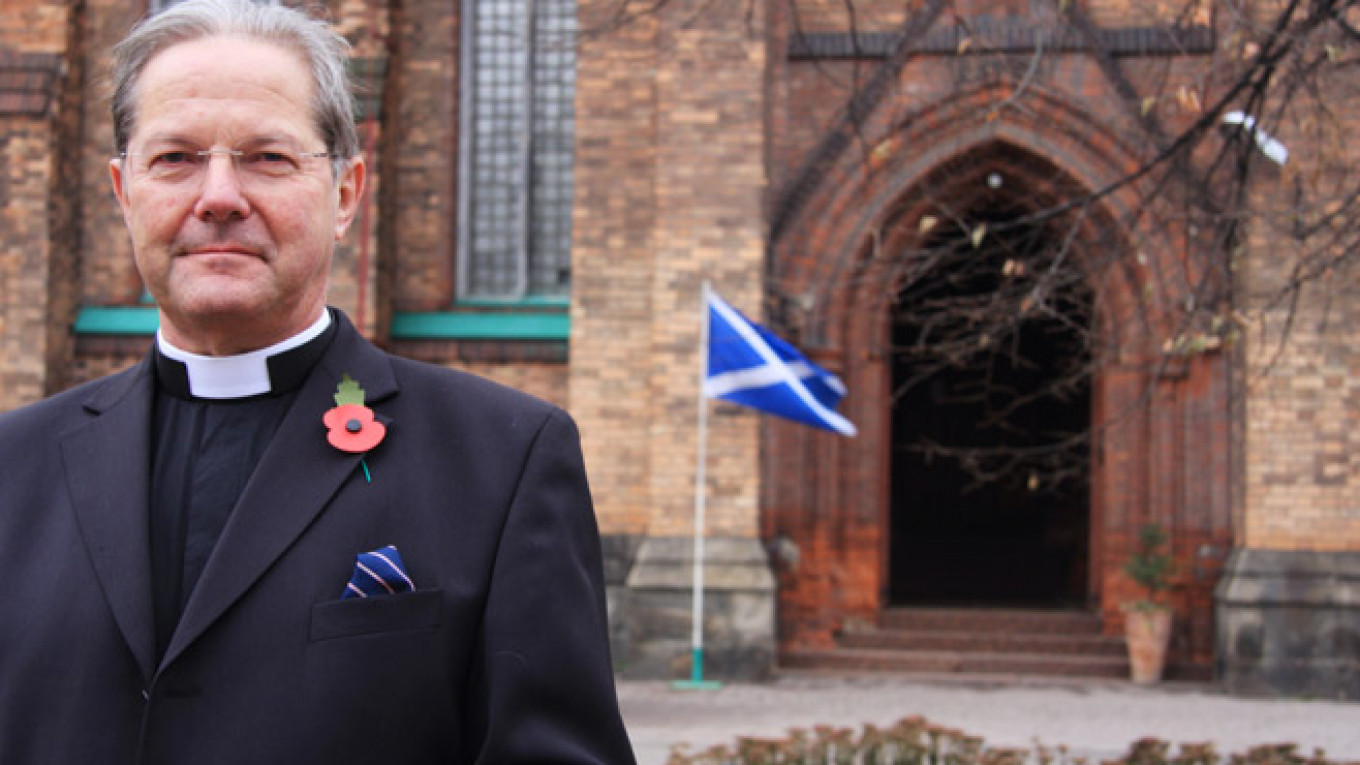When Clive Fairclough is asked whether he had any connection with the Slavic world before he arrived in Moscow earlier this year as the most senior Anglican cleric in Russia, he pauses for several seconds.
"The opposite way around, actually, because I spent 20 years of my life in NATO," he answers eventually.
It is an unlikely transformation — from British army officer in the North Atlantic Treaty Organization devising military strategies to checkmate the Soviet Union, to Anglican chaplain in Moscow. But Fairclough, who is taking courses about the Orthodox Church and planning to learn Russian, drew out a common thread.
"In my entire career I have been a peacemaker," he said in a recent interview in the parsonage next to St. Andrew's Anglican Church in downtown Moscow.
"I really believe I had a peacekeeping role as an operational soldier, and as a soldier in NATO it was all about keeping the peace. Despite all its history, NATO has actually kept world peace."
Fairclough, who came to Moscow for the first time in March, said he has been overwhelmed but is determined to make the most of new opportunities.
"I consider it a great privilege to be a guest in this wonderful country," he said. "I am taking it slowly because I want to get it right."
The Moscow position is more multilayered than Fairclough's previous post as a parish priest in rural England: It combines the role of priest-in-residence at St. Andrew's, the Archbishop of Canterbury's official representative to the patriarch and chaplain to the British ambassador.
"This job uses all my skills," he said.
Like his predecessor, who served in the position for 14 years, Fairclough has a diplomatic passport — the only Anglican priest in the world with such a status.
Fairclough left the army with the rank of major after more than 20 years, including two tours of duty in Northern Ireland. He then worked as a fundraiser for British charities before the experience that set him on the path to the priesthood.
The life-changing event took place in 1997 at a Catholic service in the Ampleforth cathedral in northern England.
"I knelt down and venerated the cross and it became the real cross of Christ and I washed his feet with my tears, they became the real feet of Christ and I could smell the sweat … and the call was I want you to be ordained," he said.
"These things happen, don't they? Not as dramatic for some, but as an extrovert I probably needed a fairly big wake-up call." Fairclough was ordained seven years later, in 2004.
While he plays down the political elements of his position in Moscow, Fairclough has a prominent role in mediating relations between the Anglican and Orthodox Churches. Current ties between the two faiths are good, and the Orthodox Church does not perceive Anglicanism as a threat, according to Fairclough.
"The Anglican Church has to appreciate that we are a much younger church than the Orthodox Church, they go right back to the Greek Orthodox Church," he said. "The Third Rome is how they see it in terms of their faith," he said, referring to the idea that the Orthodox Church is the successor to the Christianity of the Romans, transmitted via the Byzantine Empire.
The red-brick 19th-century St. Andrew's Church, where Fairclough is based, is the only Anglican place of worship in Moscow. Returned to the Anglicans in 1991, under the Soviet Union the church was used variously as a warehouse, hostel and recording studio for artists including Dmitry Shostakovich and cellist Mstislav Rostropovich.
With a mainly foreign congregation, Fairclough said turnover is quite high — but the average age is much lower than most parishes in the United Kingdom. Rising tensions between Russia and the West over Ukraine have had a noticeable impact, with people being moved away from Moscow by their companies, Fairclough said.
As a priest, isolation is one of the issues Fairclough has to deal with most often — both at the British Embassy and among his congregation.
"We're all quite isolated here. We're expats, we come from a different tradition … and those things have an effect on the mind," he said.
Looking to shake up routines at St. Andrew's, Fairclough said the church would be hosting a number of new events this winter, including Scottish country dancing.
While Fairclough has six children, they are all grown-up and in Britain. He lives with his second wife, Jo, in the church's parsonage. Both are keen horse riders, but they sold all their horses before moving to Moscow.
"For me this is a bit like a posting: an extremely unusual posting," he said.
Contact the author at [email protected]
A Message from The Moscow Times:
Dear readers,
We are facing unprecedented challenges. Russia's Prosecutor General's Office has designated The Moscow Times as an "undesirable" organization, criminalizing our work and putting our staff at risk of prosecution. This follows our earlier unjust labeling as a "foreign agent."
These actions are direct attempts to silence independent journalism in Russia. The authorities claim our work "discredits the decisions of the Russian leadership." We see things differently: we strive to provide accurate, unbiased reporting on Russia.
We, the journalists of The Moscow Times, refuse to be silenced. But to continue our work, we need your help.
Your support, no matter how small, makes a world of difference. If you can, please support us monthly starting from just $2. It's quick to set up, and every contribution makes a significant impact.
By supporting The Moscow Times, you're defending open, independent journalism in the face of repression. Thank you for standing with us.
Remind me later.







